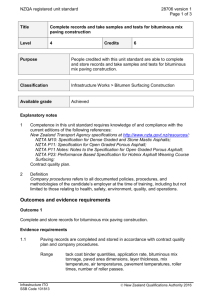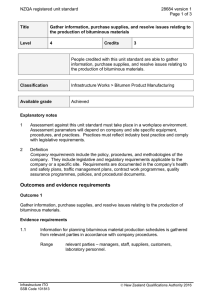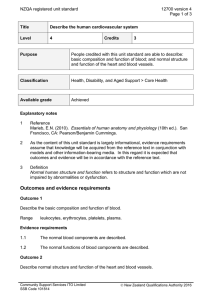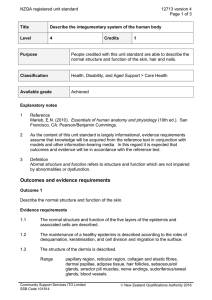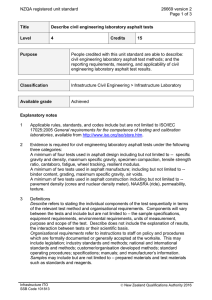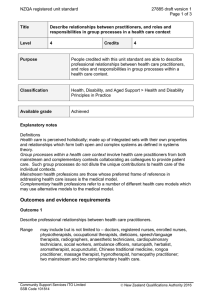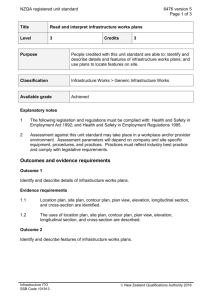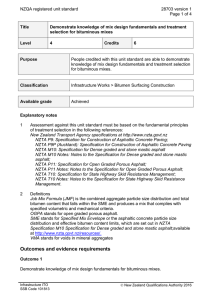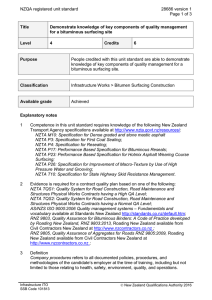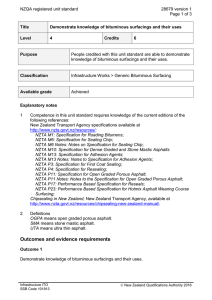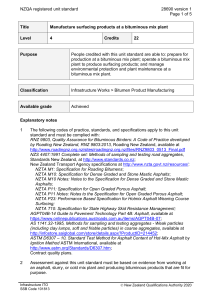NZQA registered unit standard 28689 version 1 Page 1 of 3
advertisement
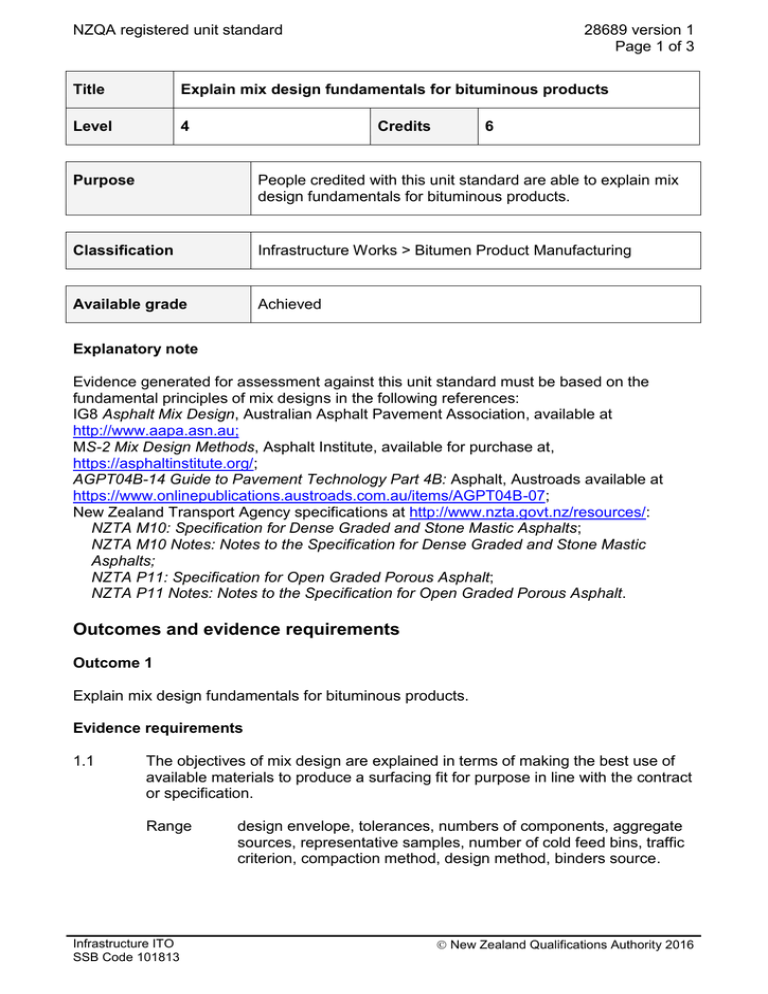
NZQA registered unit standard 28689 version 1 Page 1 of 3 Title Explain mix design fundamentals for bituminous products Level 4 Credits 6 Purpose People credited with this unit standard are able to explain mix design fundamentals for bituminous products. Classification Infrastructure Works > Bitumen Product Manufacturing Available grade Achieved Explanatory note Evidence generated for assessment against this unit standard must be based on the fundamental principles of mix designs in the following references: IG8 Asphalt Mix Design, Australian Asphalt Pavement Association, available at http://www.aapa.asn.au; MS-2 Mix Design Methods, Asphalt Institute, available for purchase at, https://asphaltinstitute.org/; AGPT04B-14 Guide to Pavement Technology Part 4B: Asphalt, Austroads available at https://www.onlinepublications.austroads.com.au/items/AGPT04B-07; New Zealand Transport Agency specifications at http://www.nzta.govt.nz/resources/: NZTA M10: Specification for Dense Graded and Stone Mastic Asphalts; NZTA M10 Notes: Notes to the Specification for Dense Graded and Stone Mastic Asphalts; NZTA P11: Specification for Open Graded Porous Asphalt; NZTA P11 Notes: Notes to the Specification for Open Graded Porous Asphalt. Outcomes and evidence requirements Outcome 1 Explain mix design fundamentals for bituminous products. Evidence requirements 1.1 The objectives of mix design are explained in terms of making the best use of available materials to produce a surfacing fit for purpose in line with the contract or specification. Range Infrastructure ITO SSB Code 101813 design envelope, tolerances, numbers of components, aggregate sources, representative samples, number of cold feed bins, traffic criterion, compaction method, design method, binders source. New Zealand Qualifications Authority 2016 NZQA registered unit standard 1.2 The process of mix design is described in terms of developing laboratory samples and comparing with product specifications. Range 1.3 proportions, aggregate types, aggregate shapes, binder content/ bitumen grades, binder types, binder temperature, additives, source properties, grading curves, air voids, mixing temperatures, contract requirements, performance tests such as wheel tracking. Methods of mix design are described in terms their differences and current use. methods – Marshall, AGPT04B-07, NZTA M/10, NZTA P/11. Range 1.4 A laboratory mix design recipe is interpreted to develop a recipe for a bituminous mix manufacturing plant that will ensure the materials are inputted correctly to achieve product specifications. correct – quality, proportions, quantity, temperature, flow rate, materials. Range 1.5 28689 version 1 Page 2 of 3 Scale-up trials are described in terms of why they are needed and what is involved in conducting them. Range quantity of trial mix made, sampling and testing requirements, plant settings, production rate. Planned review date 31 December 2019 Status information and last date for assessment for superseded versions Process Version Date Last Date for Assessment Registration 1 19 February 2015 N/A Consent and Moderation Requirements (CMR) reference 0101 This CMR can be accessed at http://www.nzqa.govt.nz/framework/search/index.do. Please note Providers must be granted consent to assess against standards (accredited) by NZQA, before they can report credits from assessment against unit standards or deliver courses of study leading to that assessment. Industry Training Organisations must be granted consent to assess against standards by NZQA before they can register credits from assessment against unit standards. Providers and Industry Training Organisations, which have been granted consent and which are assessing against unit standards must engage with the moderation system that applies to those standards. Requirements for consent to assess and an outline of the moderation system that applies to this standard are outlined in the Consent and Moderation Requirements (CMRs). The Infrastructure ITO SSB Code 101813 New Zealand Qualifications Authority 2016 NZQA registered unit standard 28689 version 1 Page 3 of 3 CMR also includes useful information about special requirements for organisations wishing to develop education and training programmes, such as minimum qualifications for tutors and assessors, and special resource requirements. Comments on this unit standard Please contact the Infrastructure ITO qualifications@infrastructureito.org.nz if you wish to suggest changes to the content of this unit standard. Infrastructure ITO SSB Code 101813 New Zealand Qualifications Authority 2016
